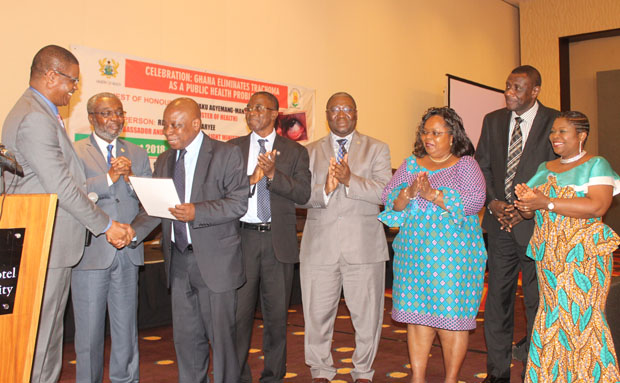Dr Owen Kaluwa handing over the WHO certification to Kwaku Agyeman- Manu as key players in the health sector look on in excitement
Ghana’s health sector has chalked yet another success with the certification of the country as trachoma-free by the World Health Organisation (WHO).
The certification makes Ghana the first in sub-Saharan Africa to eliminate trachoma as a public health problem, two clear years before the global elimination target of 2020.
“Ghana has officially been given the WHO validation letter, affirming that the country has eliminated trachoma as a public health problem,” WHO Country Representative, Dr. Owen Kaluwa, disclosed.
He was speaking at the celebration of the country’s elimination of the neglected tropical disease (NTD) which is associated with poor hygiene and sanitation and affects people in poor and rural areas in 41 countries.
Trachoma is one of the NDTs responsible for the blindness or visual impairment of about 1.9 million people and causes about 1.4 per cent of all blindness worldwide.
In 2016, an estimated 190 million people lived in trachoma endemic areas and were at risk of trachoma blindness, with Africa having the highest burden with the disease considered a public health problem in 26 out of 47 countries of the WHO’s African region.
Dr. Kaluwa, who was delighted at the achievement of the country, stated that the strong leadership, consistent collaboration with partners and the embrace of an integrated approach at all levels of programme delivery, including community participation, have been evident from the start.
“Ghana is, indeed, a trailblazer and the global trachoma community has a lot to learn from the country’s experience,” he said.
Dr. Kaluwa further acknowledged the hard work and support of health workers, volunteers, partners and stakeholders who have supported in diverse ways to the elimination of the NTD.
The Minister of Health, Kwaku Agyeman-Manu, highlighted that eliminating trachoma from previously endemic communities means the country is poised to mitigate the miserable effects of blindness by giving them the right to sight, which is necessary for their economic and social activities.
“This level of our achievement calls for jubilation and a pat on our backs. However, we cannot afford to go to sleep as one would naturally do after a success,” he said.
He sector minister, therefore, indicated that the country would continue to undertake activities to sustain the gains made, especially for environmental improvement which is very key in keeping the disease at bay.
Recalling the journey to a trachoma-free country, Dr. Anthony Nsiah-Asare, Director General of the Ghana Health Service (GHS), explained that after three years of implementation the SAFE interventions recommended by the WHO, Ghana decided to undertake a post intervention impact assessment survey in 2007 and 2018.
“It indicated that the prevalence of active trachoma (TF) fell to 0.14 to 2.87 per cent from a baseline of as high as 16.1 per cent. The results revealed that Ghana had reached the ultimate intervention goal of reducing TF in children aged 1-9 years to less than five per cent in all endemic districts,” he added.
Dr. Nsiah-Asare mentioned that after a post surveillance strategy implementation between 2010 and 2014, a pre-validation survey was done to ascertain whether the elimination thresholds have been met.
“The result showed that all endemic districts had TF less than five per cent in children 1-9 years. For Trichiasis (TT) all the districts except Yendi had met the elimination criteria of having TT less than 1 per 1000 population. Active case search was carried out in Yendi to ensure that it also met the elimination criteria,” he added.
Dr. Nsiah-Asare further explained that a dossier on trachoma was then submitted to the WHO and the country was validated as trachoma-free in May 2018.
Partners, health workers and volunteers whose work contributed to the achievement of a trachoma-free country were awarded for their good work.
By Jamila Akweley Okertchiri


